Annual Conference 1997 - Boston
Strengthening Nepal's Medical Capabilities
Annual Conference, July 5, 1997
Brandeis University, Boston
1997 Conference Report
After a series of preparatory meetings of the Organizing Committee, the
first annual ANMF convention was held on 5th of July 1997 at the
Brandeis University, Waltham, Massachusetts. Because of various
technical and logistical reasons this meeting was held as a part of,
but quite independent of, the annual convention of the Association of
Nepalis in the Americas (ANA) which took was held at the same venue
from 3-5 th July 1997.
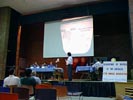
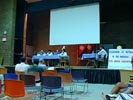
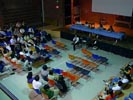
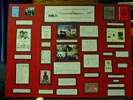
A. PRESENTING THE ANMF IN THE PLENARY SESSION
The whole
convention consisted of two parts: a presentation program in the plenary session
which was followed by the ANMF business session. The presentation session got
started at 2.30 PM at Swartz Auditorium and was attended by all the participants
of ANA as well as ANMF participants (about 250). Five speakers (one speaker
representing Health Volunteers Overseas canceled at the last minute) gave their
presentations on various topics under the general theme " Strengthening
Nepal's Medical Capabilities "
1.
Shankar Rai, MD (Assistant Professor, Dept. of Surgery, Tribhuvan University
Teaching Hospital (TUTH) at Kathmandu and currently a clinical fellow in the
division of plastic surgery at Cleveland Clinic Foundation) spoke on "Enhancing
the technical skills of Nepali doctors working in the remote district hospitals
of Nepal" where he depicted the difficulties such physicians facing. He and his
team have been trying for the past few years to share their surgical skills with
the local physicians and to improvise upon the locally available resources so
that the needy villagers (e.g. children with cleft palate, burn injuries) will
get a reasonable level of surgical care. Otherwise, these patients would be left
alone with disfigurement for their whole life even if they survive the acute
injury. This was an excellent example of the ongoing local effort to improve the
technical capabilities of the health care provider in Nepal and was well
received by the audience.
2.
Joseph Rosen, MD ( Plastic Surgeon, Dartmouth Hitchcock Medical Center, New
Hampshire) talked on " Enabling Nepali physicians to utilize telemedicine
through World Wide Web, the medical electronic linkage program". With his video
presentation he persuaded the audience in a rather impressive way how the
exchange of medical information (including images) between Nepali physicians and
physicians in America through telemedicine could help even the poor patient in
the district hospitals in Nepal. Dr. Rosen and his team have already established
the basic technical infrastructure in four hospitals in Nepal enabling the
physicians there to communicate their difficult patient problems with their
colleagues in America. Needless to say, this technology has immense potential to
improve the patient care and medical expertise of the local Nepali physicians.
Therefore, it appears that Nepal can ill afford not to exploit this.
3.
Drs. Norman Coleman and Asa Nixon (Professor and Assistant Professor
of Radiation Oncology, respectively, at Joint Center for Radiation Therapy,
Harvard Medical School, Boston, MA) made a presentation on the topic " Building
a radiation therapy center in Nepal : a great hope for cancer patients" and
briefed the audience about the on going effort to establish a Radiation Therapy
Center on the premises of Tribhuvan University Teaching Hospital (TUTH)
Kathmandu, Nepal. The audience appeared pleased to hearing that not only has a
memorandum of understanding been signed between the representatives of TUTH and
International Foundation for Cancer (Dr. Coleman is the president) to this
effect, but the land has already been allotted for this purpose. The estimated
cost of this project is around $ 2 million which includes construction,
procurement and installation of equipment and training of necessary manpower
required to run the service. Once the proposed center is functional, Nepali
cancer patients would not have to go to other countries for the purpose of
radiation therapy. What was most inspiring was the fact that this was entirely a
private, voluntary initiative and without any financial assistance from the
institutions they are affiliated with. So far the group has raised about a half
million dollars and would appreciate any help the Nepali community, or well
wishers of Nepal, can give to this project.
4.
Arjun Karki, MD (Pulmonary/Critical Care Fellow at the Brown University,
Providence, Rhode island) spoke on the topic "Institutionalizing the transfer of
medical expertise: the role of ANMF" highlighting the need for, and the goals of
the ANMF. It was emphasized that the ANMF is not here to fix all the health
problems of Nepal, but it wishes to be a partner in the improvement of Nepal's
health situation. The most appropriate role for the ANMF in this process would
be to focus itself in strengthening the technical capabilities of Nepali medical
institutions and particularly that of the academic medical centers. Academic
medical institutions are best suited to absorb and benefit from the kinds of
programs ANMF is committed to undertake, since education is the key to any
sustained improvement in national capabilities. He also suggested the several
ways people can help ANMF to accomplish its goals.
5.
Kristin Stueber, MD (Plastic Surgeon, Bay State Medical Center, Springfield,
MA) expressed her opinion on the topic " America Nepal Medical Foundation :
American Perspective ". She thought that the ANMF was most worthwhile initiative
in the light of current medical scenario in Nepal. However, given the limitation
of time and resources, it is very important that the ANMF engage itself in
concrete, practical and doable projects within the framework of its stated
goals. Despite our busy professional commitments, those of us who are aware of
the medical needs of Nepal will continue to be in support of the programs as
outlined by the ANMF.
The
program concluded at 3.30 PM. Due to the severe time constraints, not all
questions from the audience could be entertained in that session. However, Dr.
Mrigendra Raj Pandey, a senior Nepali physician on a visit to USA, who also
happened to attend the session praised the program and the effort of ANMF
profusely. Arjun Karki, MD was the moderator for the program.
B. BUSINESS SESSION
The
Business session was started at 3:45 PM at the International Lounge and was
attended primarily by ANMF participants: Nepali & American physicians
(primarily), Nurses, Public Health specialists and others (about 40 altogether)
coming from California, Illinois, Indiana, Maine, Massachusetts, Michigan, New
Hampshire, New Jersey, New York, Ohio, Pennsylvania, Rhode Island.
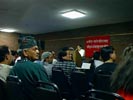
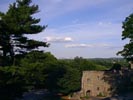
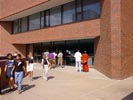
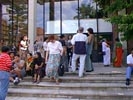
The agenda for this
session consisted of: ANMF updates, ANMF bylaws, Election of ANMF Boards of
Directors and Executive committee, ANMF membership, Future programs of ANMF,
ANMF communication and Miscellaneous.
1. At the
beginning of the session,
Dr. Karki presented a brief review of the current status of ANMF and its
accomplishments including: its publicity among a larger Nepali community living
in North America but also in other countries, registration of ANMF in New York
State, creation of a database of North America based Nepali physicians / health
professionals and others with an interest in ANMF, collection and dispatch of
medical journals for the medical school library in Kathmandu. In addition some
medical supplies (e.g. angiographic catheters) have been sent to Nepal (TUTH) as
per their request. An ANMF website has been created. Above all, he emphasized
that this particular gathering itself is a living proof that the ANMF will
continue to get the needed love and support as it embarks to pursue its goals.
Lastly, on behalf of the ANMF he expressed the gratitude to Dr. Blair for kindly
continuing to host the ANMF secretariat at his office.
2.
Vljaya Sigdel, who was instrumental in obtaining help from the lawyers free
of cost, both for the ANMF registration and the formulation of ANMF bylaws,
presented the main concepts and provision of draft bylaws which were distributed
to all the participants. Due to time constraints not all the points in that
bylaws could be discussed and endorsed then and there. However, it was agreed
that mission statements should be mentioned and the principle of "Robert's Rules
of Order" should be incorporated in the statute/ bylaws. Hence it was decided
that, Mr. Sigdel will, after collecting the opinions and suggestions from all
the ANMF members/supporters, develop (in consultation with the lawyers as and if
necessary) a final version of the bylaws which will be submitted to the Board
and which will come into effect once the Board ratifies it.
3. Dr.
Rai, the chairman of the nominating committee, presented a list of the
individuals for the position of board of directors and executive Committee
(please refer to the attached list for details) which was unanimously endorsed
by the participants present in the session. Since this was the first event in
the history of ANMF, Dr. Rai mentioned that the list was based on the responses
received from the ANMF supporters to the questionnaire distributed about 2
months ago, keeping in mind the overall interests of the ANMF.
4. Although no formal membership was issued so far, given that the bylaws are in evolution, that process should be started soon. A draft copy of the membership application was distributed to all the participants (and will be distributed from the ANMF secretariat at a later date to those who could not attend that particular meeting) to that effect. It was unanimously agreed that there should be a membership fee and the annual membership rate would be as following:
- $10.00 / yr for students.
- $25.00 / yr for physicians in training (Residents, Fellows).
- $50.00 / yr for others.
The issue
of life memberships and honorary membership was raised and will be dealt with in
the bylaws in greater detail.
5. Following were the programs that the participants of the meeting thought the ANMF should undertake in the next few years:
- Continue to procure and send medical learning resource materials to the medical school library in Kathmandu (TUTH). This will include, but is not limited to, core standard textbooks (current edition), peer reviewed professional journals (old series are OK provided they are a complete set), audiovisuals and CD ROM series in all the major clinical and basic science disciplines. Donations from individual subscribers are encouraged, but a subscription can also be purchased if, and as, needed. The local ANMF support group in Nepal will, in consultation with the TUTH librarian and the program directors of various on going undergraduate and postgraduate medical training programs, prepare and submit the list of materials needed as we move along. The ANMF Executive Committee will soon designate a person to coordinate this program.
- Organize a Continuing Medical Education (CME) program, on a regular basis in Nepal. The speakers will mainly be from USA and possibly Canada, willing to go there and share their knowledge and skills for the benefit of local physicians colleagues there. The expenses incurred in the process will be borne by the individual speakers. The first CME program is scheduled for November, 1998. Drs. Roshan Shrestha (from Denver, CO) and Brendan Thomson (from Phoenix, AZ) are working together to make it happen. Dr. Prativa Pandey is working closely with the Dept. of Medical Education of the medical school and other local professional bodies in Nepal to identify the areas/ topics to be covered the program.
- Explore the opportunities for, and facilitate the training of, Nepali professionals in North America in areas that are considered a priority need for Nepal. The field of Biomedical Engineering is one such area currently identified. Dr. Gauri Shankar Adhikary is making preliminary enquiries with the concerned authorities of the University of Michigan. ANMF executive committee will soon designate a person to coordinate this program.
- Support for/collaborate with the following ongoing or upcoming medical
projects that are directed towards the strengthening the medical capabilities
of Nepal:
- Telemedicine through WWW: the medical electronic linkage program initiated by Joseph Rosen, MD and associates.
- Nepal Radiotherapy Cancer Center project initiated by Norman Coleman, MD and associates.
- Improving the emergency medical services in Nepal initiated by David Wachter, MD and associates.
- Drs. Larry Herman and Lewis Clayman from Health Volunteer overseas have expressed their interest to collaborate with Nepal in the field of Dental health. The specific details needs to be discussed further.
6. Dr. Charles Richert has already set up a web site for ANMF: http://car.upmc.edu/anmf/ In addition, he is also working on to establish an e-mail communication system among the ANMF members.
7. The following decisions were also made :
Proceed with the necessary paper work to obtain tax exempt status for ANMF.
- Raise $ 700 to cover the fees for the above process.
- Decide upon the date/venue of next ANMF annual meeting.
- Form a fund raising committee.
Following concluding remarks by Dr. Blair, the session ended
around 7:30 PM. Dr. Tulsi Maharian was the moderator of the second session.
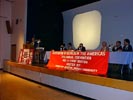
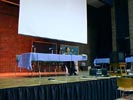
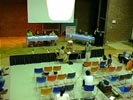
(Compiled and prepared by Sanjaya Khanal, MD)